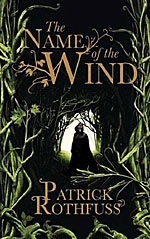
![]() Tar Daddoo
Tar Daddoo
8/10/2013
![]()
What is the Fantasy premise?
The Name of the Wind is the first book in the Kingkiller Chronicle, which appears to be a trilogy though the final book has not yet been published. It follows the life of Kvothe from childhood through his earliest year or so at the University, albeit at a very young age. (I believe he was about sixteen at the end of the story.)
The University is a place to learn about magic and how to control it. There he learns about Sympathetic magic, Sygaldry, Alchemy, and Naming. Over the course of his life he also encounters other, deeper forms of magic that establish his lifetime quest.
Where does the Fantasy premise come from and what governs its use?
One of the more appealing aspects of the book is the way that it deals with the magic learned at the University. There is a lot of explanation about this magic; how it operates; what its limits are; and when to use it. These magical abilities are treated like sciences.
As for the deeper magic, this remains inexplicable throughout the book.
Is the impact of the premise on an individual explored?
Much of the book consists of episodes in which the University magic is used sometimes casually and sometimes with serious purpose. Ultimately, Kvothe's life is shaped by his use of magic, sometimes to good effect and sometimes less so. We can see his confidence and pride grow as his abilities grow.
Is the impact of the premise on society explored?
One of the accomplishments of The Name of the Wind is to depict a rather complete fantasy world referred to as the four corners of civilization. While this world draws on familiar ideas of medieval society, kingdoms, gypsy life, and so on, the author does not rest on stereotypes. He pulls us into a fully developed world with its own social groupings, languages, religion, history, superstitions, and science (as seen through the University.)
Against this backdrop, the magic of the University is seen quite differently depending on the sophistication of the person encountering it. Among those who can afford it, the magic of the University is an important aspect of society for the medicine provided, the useful tools and artifacts provided, and even the protection it can provide. There is an ever present consciousness, however, that magic can be misused. Both the rules of the University and the laws of the society are designed to protect against such misuse.
As for the less sophisticated in the society, there are tales of great magicians from the past, but only occasional brushes with the University magic. When this occurs, it is sometimes explained away, sometimes treated with superstitious awe, and sometimes treated as demonic in origin. While the University students are inclined to view the ignorant with condescension, the ignorant are merely doing what is always done: explaining the inexplicable with the tools at hand.
The deeper magic is a much greater mystery even to those in the University. It is encountered so little that only the ignorant appear to believe in it. Sometimes it is only known through children's stories or legends and myths. Kvothe cannot even speak of his first-hand experiences for fear that he will be derided and deemed either foolish or crazy.
How well written is the story?
The Name of the Wind is a rather long book (700 pages), but it is easy to read. In fact, I found it difficult to put the book down.
The most troubling aspect of the book is that it only starts the overall story and is not really a complete story unto itself. We are greeted with the first few years of Kvothe's life, but this is told in flashback. We know from Kvothe's current situation that there is much more to the story that has not yet been told. We have only obtained background information about Kvothe, the world he lives in, and the great quest he has set for himself.
This background information is told compellingly enough, but through a vast collection of small stories, not through any single story arc requiring 700 pages. It is not altogether clear why the author continued to or stopped at 700 pages. There is no clear challenge, issue, or concern that is resolved over the course of the book.
Can I recommend the book?
If you are comfortable with reading long books, enjoy the portrayal of fantasy worlds, and take an interest in explanations of magical abilities, you will probably enjoy The Name of the Wind. You should understand, however, that your journey will not end with this book; it only starts here. Indeed, you would do well to think of this book as merely the beginning of a much longer book.
If you are uncomfortable reading long books, cannot sustain your interest with many small stories when there is a much larger story to be addressed, or simply feel that a story should resolve some conflict worthy of its length, you may find The Name of the Wind either exhausting or disappointing.
If you are not sure which kind of reader you are, give it a try and find out. My prediction is that, for better or worse, you will feel compelled to read the next book in the trilogy.